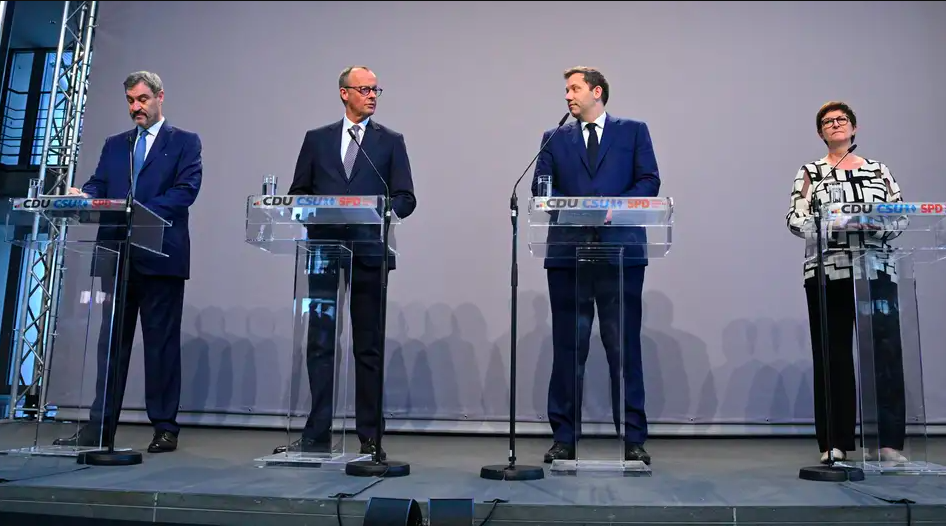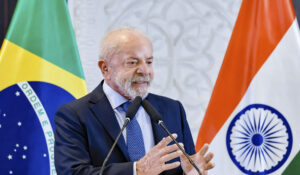
Published 09/04/2025 15:35 | Edited 09/04/2025 18:22
Germany took a decisive step on Wednesday to prevent the far right from reaching power. Conservative Friedrich Merz, leader of the Christian Democratic Union (CDU), announced a coalition agreement with the Social Democrat (SPD), currently led by chancellor Olaf Scholz. The alliance also includes the Christian Social Union (CSU), a CDU sister acronym in Bavaria, and prepares the land for Merz to take command of the German government in early May.
The union between conservatives and social democrats aims to contain the advance of the far-right party alternative to Germany (AFD), which ranked second in the February early parliamentary elections, with 20.8% of the votes. CDU/CSU was the most voted (28.6%), and the SPD ended third (16.4%).
“New Start” for the country
By announcing the pact in Bundestag (Parliament), Merz stated that the deal is “a sign of a new beginning to our country” and promised reforms and investments that bring “more security and economic strength” to Germany. The coalition agreement still needs to be confirmed by internal votes in the three subtitles, but Merz is expected to be elected chancellor in early May.
The new government will be formed in the midst of a tense international conjuncture, with geopolitical and economic instability aggravated by US President Donald Trump’s protectionist measures, such as increased tariffs on European Union products and automotive sector – a separate point of the German exporting economy.
Route Change and New Economic Agenda
Although traditionally advocates of tax rigor, CDU/CSU conservatives were surprised to support the reform of the “debt brake”, allowing the creation of a € 500 billion fund for defense and infrastructure over the next ten years. The change is attributed to the perception that the US is moving away from military commitments in Europe and the prolonged war between Russia and Ukraine.
The CDU will take the Foreign Ministry for the first time in almost six decades, in addition to five other folders, including transportation and digital affairs. The SPD will have seven ministries, including finance, defense and environment.
Far-right reaction
The advance of AFD at the polls – and now in opinion polls, with 25% support, surpassing CDU/CSU for the first time according to the Ipsos Institute – was a decisive factor for the formation of the alliance. Friedrich Merz, who in the past flirted with the possibility of alliances with the far right, denied any coalition with AFD after winning the February elections, and began to sew the partnership with the SPD.
The new coalition was celebrated as a brake on the advancement of the ultra -right, but also received criticism from conservative sectors for giving in to points from the economic agenda and resuming alliances seen as “great coalition”, something common in previous but recently worn decades.
Migration, Citizenship and National Security
Migratory policy will be one of the central themes of the new government. Merz promised to “end irregular migration”, with increased border control, acceleration of deportations and limitation of asylum applicants entry. The CSU, which will command the Ministry of Interior, should lead the application of these measures.
In the issue of citizenship, the agreement eliminates the possibility of obtaining nationality in just three years – provided for in the Scholz government for exceptional integration – but maintains the general period of five years (once eight) and the possibility of double citizenship.
In addition, a National Security Council will be created, subordinate to the Chancellery, to coordinate strategic decisions of foreign policy and defense.
Reduction of spending and incentives for competitiveness
The coalition foresees a 10% cut in administrative spending by 2029, except for security areas. There are also plans to reduce companies’ income tax from 2028 and the tariff on electricity, aiming to stimulate the competitiveness of German industry, currently under pressure because of the economic crisis and energy costs.
Resources for international organizations and development programs should be reduced by € 1 billion – a measure justified as part of the downsizing of state bureaucracy.
An attempt to brake setbacks
The covenant between CDU/CSU and SPD is, in essence, a political effort to prevent Germany’s return to an authoritarian and extremist past. At a time when far-right parties advance in several countries in Europe, the alliance represents an attempt to preserve democratic values, consolidate a minimal common agenda and shield the country against radicalization.
Merz ended his speech by noting that “we will help shape change in the world” and promising “ample support for Ukraine.”
Germany’s recent history teaches the value of democracy. The new coalition, among historical opponents, bets on institutional responsibility to prevent the winds of authoritarianism from gaining more strength.
Source: vermelho.org.br

